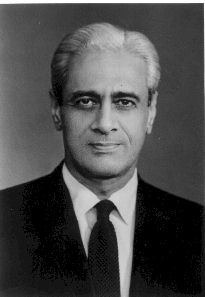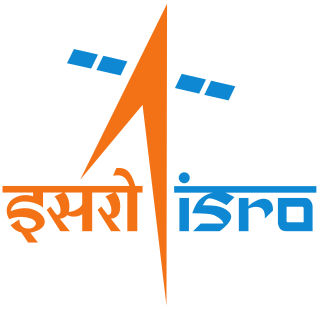M. Annamalai | |
|---|---|
| Born | 1945 Tamil Nadu, India |
| Alma mater | IISC |
| Occupation | Space scientist |
| Employer(s) | ISRO Satish Dhawan Space Centre |
| Awards | Padma Shri (2011) |
M. Annamalai, from the South Indian state of Karnataka, is a space scientist. He is a former director of the Satish Dhawan Space Centre, in Sriharikota and holds the position of the Senior Advisor (Space Transportations Systems) at ISRO. [1]
Annamalai is a post graduate in Space Engineering from the Indian Institute of Science, Bengaluru and joined ISRO in 1970. He is credited with contributions in many areas of vehicle launch such as infrastructure development, design, integration and testing. He has also designed the 1.2 M Infrared astronomy telescope of Physical Research Laboratory at Mount Abu and many Antenna mounts for the ISRO network for tracking satellites and launch vehicles. [1] The Government of India honored Annamalai in 2011, with the fourth highest civilian award of Padma Shri. [2]

Satish Dhawan was an Indian mathematician and aerospace engineer, widely regarded as the father of experimental fluid dynamics research in India. Born in Srinagar, Dhawan was educated in India and further on in United States. Dhawan was one of the most eminent researchers in the field of turbulence and boundary layers, leading the successful and indigenous development of the Indian space programme. He succeeded M. G. K. Menon, as the third chairman of the Indian Space Research Organisation (ISRO) in 1972. The second launch pad of ISRO, Satish Dhawan space centre is named after him. He is greatly regarded as the man behind A. P. J. Abdul Kalam.

Satish Dhawan Space Centre – SDSC, is the primary spaceport of the Indian Space Research Organisation (ISRO), located in Sriharikota, Andhra Pradesh.

Mylswamy Annadurai, popularly known as the Moon Man of India, is an Indian scientist working as vice president for Tamil Nadu State Council for Science and Technology, Chairman, Board of Governors, National Design and Research Forum. He was born on 2 July 1958, in Kothavadi in the Coimbatore district, Tamil Nadu state of India. Prior to taking this assignment he was with Indian Space Research Organisation and served as director of the Indian Space Research Organisation Satellite Centre. During his 36 years of service in the Indian Space Research Organisation, he had some of the major contributions, including two of the major missions of ISRO, namely Chandrayaan-1 and Mangalyaan. Annadurai has been listed among 100 Global thinkers of 2014 and topped the innovators list. His works are mentioned in textbooks of Tamil Nadu Board of Secondary Education

The Liquid Propulsion Systems Centre (LPSC),Thiruvananthapuram is a research and development centre functioning under Indian Space Research Organisation (ISRO). It has two units located at Valiamala, in Thiruvananthapuram of Kerala, and Bengaluru of Karnataka. LPSC is augmented by ISRO Propulsion Complex at Mahendragiri of Tamil Nadu.
G. Madhavan Nair is an Indian space scientist and a former Chairman of the Indian Space Research Organisation, and Secretary to the Department of Space, Government of India. He has also been the Chairman of the Space Commission and Chairman of the Governing Body of the Antrix Corporation, Bangalore.

RISAT (Radar Imaging Satellite) is a series of Indian radar imaging reconnaissance satellites built by the Indian Space Research Organization (ISRO). They provide all-weather surveillance using synthetic aperture radars (SAR).

Reusable Launch Vehicle–Technology Demonstration Programme is a series of technology demonstration missions that has been conceived by the Indian Space Research Organisation (ISRO) as a first step towards realising a Two Stage To Orbit (TSTO) re-usable launch vehicle, in which the second stage is a spaceplane.

The chairman of the Indian Space Research Organisation is the statutory head of the Indian Space Research Organisation (ISRO). The officeholder is a secretary to the Government of India and an executive of the Department of Space (DOS) which directly reports to the prime minister of India.
Vipparthi Adimurthy is the ISRO Honorary Distinguished Professor, VSSC. He was the former Satish Dhawan Professor and Dean of Research at the Indian Institute of Space Science and Technology (IIST). Prior to joining IIST, Adimurthy held the post of associate director at the Vikram Sarabhai Space Centre, a major facility center of Indian Space Research Organisation (ISRO). He is known for his contributions to the rocket technology and space dynamics. He is a recipient of Padma Shri from the Government of India. Murthy is the Mission Concept Designer, for India's Mars Orbiter Mission.
M.Y.S. Prasad is an Indian scientist and the former director of the Satish Dhawan Space Centre Sriharikota Range (SDSC-SHAR). Govt. of India’s Civilian Award Padma Shri for the year 2014 for his distinguished service in Science and Technology.

M. C. Dathan is an Indian space scientist and former director of the Vikram Sarabhai Space Centre (VSSC). The Government of India honoured him, in 2014, by awarding him the Padma Shri, the fourth highest civilian award, for his contributions to the fields of science and technology. In May 2016, the Government of Kerala appointed MC Dathan as the scientific advisor to chief minister.

The Crew Module Atmospheric Re-entry Experiment (CARE) is an experimental test vehicle for the Indian Space Research Organisation's future ISRO orbital vehicle called Gaganyaan. It was launched successfully on 18 December 2014 from the Second Launch Pad of the Satish Dhawan Space Centre, by a LVM3 designated by ISRO as the LVM 3X CARE mission. Total cost of mission was ₹155 crore. Cost of launch vehicle and CARE module was ₹140 crore and ₹15 crore.
Nagarajan Vedachalam is an Indian space scientist, K. R. Ramanathan Distinguished Professor of the Department of Space and distinguished scientist emeritus of Indian Space Research Organization, known for his contributions to Indian space programme. He is a former director of the Liquid Propulsion Systems Centre that developed the cryogenic engine of the Geosynchronous Satellite Launch Vehicle (GSLV) and is reported to have associated with over 100 space programmes of ISRO. He continues to sit in many committees of the Department of Space though officially retired from ISRO service as the director of ISRO Inertial Systems Unit (IISU) and holds several patents for his innovations.
Nilamber Pant is an Indian space scientist, a former member of the Space Commission of India and a pioneer of satellite based communication and broadcasting in India. He served at the Satish Dhawan Space Centre and the ISRO Satellite Centre before becoming the vice chairman of the Indian Space Research Organization (ISRO). The Government of India awarded him the fourth highest Indian civilian honour of Padma Shri in 1984.
Madhavan Pillai Ramakrishna Kurup was an Indian rocket scientist and the founder of the first solid rocket propellant plant in India at the Vikram Sarabhai Space Centre. He is known to have contributed to the successful launching of the Augmented Satellite Launch Vehicle (ASLV) as the director of the VSSC centre in Thiruvananthapuram. The Government of India awarded him the fourth highest civilian award of Padma Shri in 1990.
Tumkur Seetharamaiah Prahlad is an Indian aerospace scientist and the former director of the National Aerospace Laboratories (NAL), Bengaluru, known as a specialist in Aerodynamics and Aerospace Design. His contributions are reported in Indian civil aircraft development programmes of Hansa and NAL Saras and light combat aircraft development programme. The Government of India awarded him the civilian honour of the Padma Shri in 2004, The same year, he received the H. K. Firodia Award from H. K. Firodia Memorial Foundation.
Suryanarayanan Srinivasan (1941–1999) was an Indian aeronautical engineer and the Director of the Vikram Sarabhai Space Centre (VSSC), known for his pioneering work in rocket science. He also served as the director of Satish Dhawan Space Centre and assisted A. P. J. Abdul Kalam in the SLV3 Mission as its deputy director. He was an elected Fellow of the Aeronautical Society of India and the Indian National Academy of Engineering. The Government of India awarded him the third highest civilian honour of the Padma Bhushan, in 2000, for his contributions to Indian space program.
Katuru Narayana is an Indian rocket scientist and a former director of Satish Dhawan Space Centre, one of the two launch centres of the Indian Space Research Organisation. He held the post from 1999 to 2005 after which he served as the co-chairman of the Mission Readiness Review Committee for two Indian space programs, Polar Satellite Launch Vehicle and Geosynchronous Satellite Launch Vehicle. He is a recipient of an honorary doctorate from Sri Venkateswara University. The Government of India awarded him the fourth highest civilian honour of the Padma Shri, in 2002, for his contributions to science and engineering.
Kulasekarapattinam Spaceport is the second spaceport of the Indian Space Research Organisation (ISRO), located in Kulasekarapattinam, a coastal village in Thoothukudi district of Tamil Nadu, India. The facility is being constructed over 2,350 acres. As of September 2023, more than 90% of land has been acquired and the groundbreaking was done on 28 February 2024.